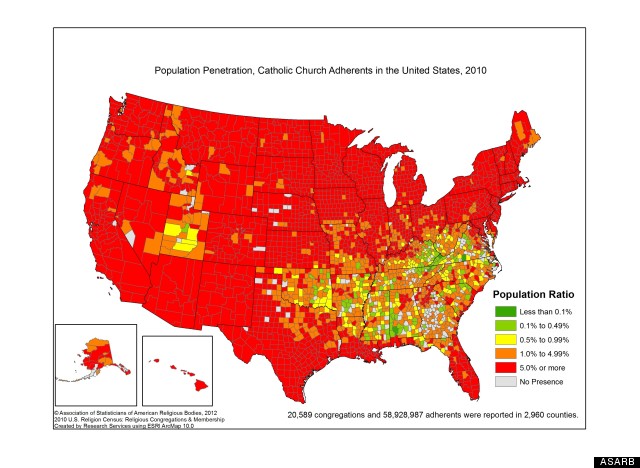I was raised a liberal Catholic. I'm learning now that conservative Catholics believe we don't exist, that the phrase is oxymoronic, but it's not and we do and we're there, volunteering in your churches, passing out the Bread of your Masses, playing your organs, teaching your children, nursing your poor, counseling your mentally ill.
But I was also raised a profoundly Protestant Catholic, and that phrase is indeed oxymoronic. It was quite ironic that while Protestant theology, even when alarmingly anti-Catholic, has nevertheless never managed to completely erase its centuries of Catholic theological history, that my personal Catholicism was affected by and filtered through a very Protestant lens.
Let me explain. I've spent my life in one of three places: Tulsa, OK; Kansas City, MO; and Alabama. Take a quick peek at the map of the United States below: the northwestern part of Oklahoma, all of Missouri, and all of Alabama are all very minority states for Roman Catholics, ranging from 0.5% up to 4.99%.

Now look at the map of US religions and denominations below:
 As you see, my areas of the country are mostly Baptist. Within walking distance of my house are five different Baptist churches (because, once they've split once from the Mother Church, nothing stops them from splintering anew every time doctrine, life, and the Word are difficult to interpret).
As you see, my areas of the country are mostly Baptist. Within walking distance of my house are five different Baptist churches (because, once they've split once from the Mother Church, nothing stops them from splintering anew every time doctrine, life, and the Word are difficult to interpret).
Do you know something about Baptists? They hate Catholics. They are better known now for hating gays, but before that they were known for hating drinking and even before that for hating Catholics. Their hatred of us runs far and deep. I guess because they know they came from us, and are desperate to justify that great schism from Christ's original church, that many feel they must demonize and fear us. Certainly misinformation on us abounds.
As a child, I was the only Catholic in my class of 100 public school students. There were 5 of us in the middle school together, and we were all in the same CCD (Bible study and catechism lessons) class growing up. So there weren't many of us, and the kids around us hadn't had much exposure. They reacted to Catholicism as their parents did, modeling perfectly their elders' horrified cringing, irrational fear of the unknown, and superstitious dread of something they did not understand but felt was bad. Any time Catholics were mentioned in history class, someone wondered aloud, "But... they're not Christians, are they?" I quickly learned to exchange these inexplicably emotionally-charged words for my audience to ones they accepted in conversation without murmur: mass became church, CCD became Sunday school, priest became pastor, and Eucharist became communion. Mary wasn't mentioned, except to heatedly exclaim that we did not worship her, and I was quick to protest that I didn't pray to Mary or to saints; my family wasn't like that. One year I received anti-Catholic pamphlets at Halloween instead of candy. Once I befriended two Southern Baptists on the bus who, after weeks of mutually enjoyable bus-friendship, began strongly affirming the atrocity of homosexuality. Not homosexual myself, I nonetheless felt a little sorry for the victims of such heated hatred, and who might moreover (I ventured to say) be struggling and alone and more in need of compassion and tolerance than ever. This led to several days' of arguments, eventually culminating in me asking, aghast, if they were saying they despised gay people so much they'd stop being my friend if I were gay, despite knowing me, liking me, sharing laughter and fun and teasing and happy memories with me.
They both thought solemnly, they decided that yes, it meant they wouldn't be able to be friends with me any more.
I was both hurt and appalled.
In college, I enjoyed the refreshing novelty of various churches of other denominations, gamely accompanying several friends and boyfriends to their services, sampling several over the years. I was pleasantly surprised by how similar the Lutheran service and theology was, and to a lesser degree the Methodists, and I enjoyed the enthusiasm and singing at Baptist, AG, and non-denom. I appreciated the heartfelt adoration of the Nazarenes. A few friends obligingly accompanied me to mass, the Lutherans and Methodists often quite enjoying it and the Nazarenes politely interested. But my Baptist friends, they tended to go white at the suggestion, stammer, make excuses: one even told me she couldn't possibly go to a Catholic Church, her mother would simply never agree. This was a sophomore in college whom I had accompanied to her services several times (including one when Catholics were specifically singled out for the fires of hell during the pastor's sermon), we belonged to the same Christian sorority, and had prayed, studied the Bible, and attended praise and worship together many times. That hurt.
So it's really no wonder that I became a Catholic who, while raised by Catholics attending a Roman Catholic church, was a bit ashamed of what I viewed as my religion's embarrassing excesses when it came to saints and ceremony and sexual theology. Certainly all the influential friends and mentors who most influenced me in my young quest for adult faith were Protestant, and while loving, faithful people, the theology I was picking up as a young adult was very Bible-based, dismissive of tradition or culture or the authority of the church over my life or my beliefs.
Now how did the Protestant Catholic become a Petrified (Catholic) Catholic? That, my friends, is a story for Part II.
Are you a Catholic from a majority or minority Catholic area? How has that affected your own and others' view of your faith?

No comments:
Post a Comment